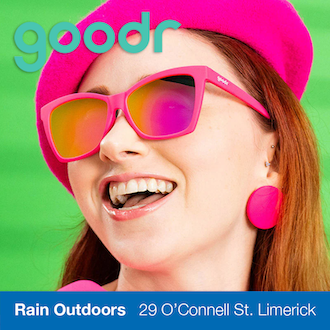 Limerick urged to reduce its water consumption
Limerick urged to reduce its water consumption
90% of Limerick people have no idea how much water they use, despite using on average, over 150 litres a day, according to national research conducted by Ideal Standard International. The survey, which was conducted by Ideal Standard following World Water Day, found that people in Limerick unwittingly waste excessive amounts of water doing everyday tasks, especially in the bathroom.
33% of those surveyed use in excess of 163 litres a day on showering, brushing their teeth and flushing the toilet alone.
Not surprisingly, showering accounts for the largest volumes of water used in the bathroom. Almost 33% of respondents take 10 minutes or longer in the shower each day, with over
70% letting the water run for an average of 1 minute before getting in. If we take into account the fact that that showers use a minimum of 9 litres of water per minute, then 50% of respondents who shower on a regular basis, use at least 99 litres of water per day showering alone.
Results from the survey hints at urging people in Limerick to consider how much water they use each day and find easy ways to conserve this vital and precious resource in the bathroom. This can be achieved by making simple changes to the bathroom routine or by swapping guzzling taps, baths or toilets for more water friendly alternatives.
Survey results show that 70% of Limerick people flush the toilet between 5-6 times a day, using on average 40 litres of water per day. The average toilet uses 8 litres per flush with old style single flush toilets using as much as 13 litres of water per flush. Households can reduce the amount of water they use, by replacing old toilets with water-efficient dual-flush toilets, which use only 6 litres for a full flush and 4 litres with a reduced flush. Water use can also be reduced by the installation of waterless urinals, which are popular across Europe.
Gerard Walsh, MD, Ideal Standard said, “We have researched bathroom water usage to make people aware of the amount of water that is unnecessarily wasted in their bathroom each day. We have found that although 90% of people in Limerick are interested in reducing the amount of water they use there is a distinct difference in the amount of water people think they use and their actual consumption levels.
“Water is a precious commodity and there are a number of simple steps that people can take to reduce their water usage, from reducing the amount of time spent showering, to reducing the flow from taps, or turning taps off when not in use and where possible, replacing old toilets with more water efficient alternatives.”
An easy and cost free way to reduce personal water consumption is by turning the tap off when brushing teeth. Half of Limerick people (50%) brush their teeth twice daily, as recommended, for an average of 1-2 minutes per brushing. Most (70%) leave the tap running, wasting 6 litres of water per minute, that’s 24 litres per day. By turning the tap off when brushing this can be reduced to just 2 litres per day. Fitting flow regulators to taps can also cut down on unnecessary water usage and the market has available a range of mixer tap regulators designed to give a maximum flow rate of 5, 4, or 2 litres per minute.
The 2010 World Water Day theme (which was held on March 22 last) was Clean Water for a Healthy World – there are an estimated 1.1 billion people around the world that rely on unsafe drinking-water solutions. In many developing countries, water consumption is as low as 20 litres a day for the average person.
The survey also showed:
– 30% of respondents in Limerick take a bath 2-3 time per week while 40% never take a bath
– The Environmental Protection Agency has revealed that a dripping tap can waste up to 90 litres of water a day leading to excess water wastage in older bathrooms
– 70% of those surveyed have an electric shower
– Over the years WC flush volumes have reduced from as much as 20 litres in the mid 20th century down to 6 litres or less today







